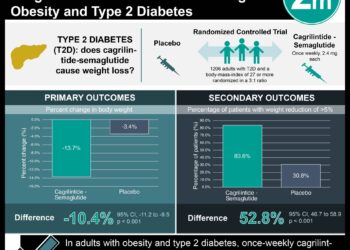Swedish study shows better glycemic control with continuous glucose monitoring
1. Continuous glucose monitoring (CGM) more effectively lowered HbA1c and standard deviation of blood glucose than conventional therapy.
2. Subjective self-reports of well-being and satisfaction with treatment were increased among patients undergoing CGM than conventional therapy.
Evidence Rating Level: 1 (Excellent)
Study Rundown: Among patients with type 1 diabetes, careful blood glucose monitoring and intermittent insulin administration can achieve relatively tight glycemic control. As opposed to self-monitoring, wherein patients analyze their blood glucose and inject themselves manually with insulin, recent advances in technology have allowed for implantable devices that allow for continuous glucose monitoring (CGM). In this un-blinded, cross-over, randomized controlled trial conducted in Sweden, patients with poor glycemic control were randomized to receive 6 months of either conventional therapy or CGM followed by another 6 month period using the alternative therapy. CGM resulted in a significant decrease in HbA1c as well as standard deviation of blood glucose levels. In addition, patients relying on CGM reported improved levels of overall well-being, treatment satisfaction, and less fear of hypoglycemia. There was no difference in adverse events between groups.
This study suggests that CGM may be superior to conventional therapy for patients with poor glycemic control. However, more studies need to be performed to determine the effects of CGM in a broader patient populations, including those with good glycemic control particular comorbidities. In addition, a cost-benefit analysis between CGM and conventional therapy would greatly aid in the adoption of this technology.
Click to read the study in JAMA
In-Depth [randomized controlled trial]: A total of 161 type 1 diabetics with HbA1c above 7.5% were randomly assigned to CGM or conventional therapy for 26 weeks, followed by a 17 week washout period, and then 26 weeks of the alternative therapy. At baseline, all patients used self-injection for insulin, as patients with insulin pumps were excluded. CGM reduced HbA1c by 0.43% (CI95 0.29 to 0.57%) more than conventional therapy. Likewise, CGM resulted in a lower blood glucose standard deviation (68.49 vs 77.34; p < 0.001). Patients who adhered to the CGM monitor protocol at least 70% of the time or more received benefit while those who didn’t were statistically similar to the conventional therapy group. CGM increased overall wellbeing (estimated by the WHO-5 66.1 vs 62.7; p = 0.02), and treatment satisfaction (Diabetes Satisfaction Questionnaire 30.21 vs 26.62; p < 0.001). It also reduced the fear of hypoglycemia (Hypoglycemia Confidence Questionnaire 3.40 vs 3.27; p < 0.001) compared to conventional therapy. No differences were found in the rate of adverse events.
Image: PD
©2017 2 Minute Medicine, Inc. All rights reserved. No works may be reproduced without expressed written consent from 2 Minute Medicine, Inc. Inquire about licensing here. No article should be construed as medical advice and is not intended as such by the authors or by 2 Minute Medicine, Inc.







